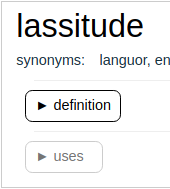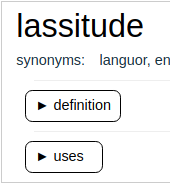If not all the uses are show, what indicates the selected vocabulary word is in a vocabulary collection?
The “uses” button is greyed-out when the word is not in that vocabulary collection. If we believe the word is in a selected book, then the “uses” button will have a black border. This makes it possible to click through different book titles on the side menu and quickly ascertain whether that vocabulary word is in that collection.
Remember that we do not necessary show every vocabulary word use for every title, but if we claim a word is in a book, then it is probably in that book (or at least some form of that word).

